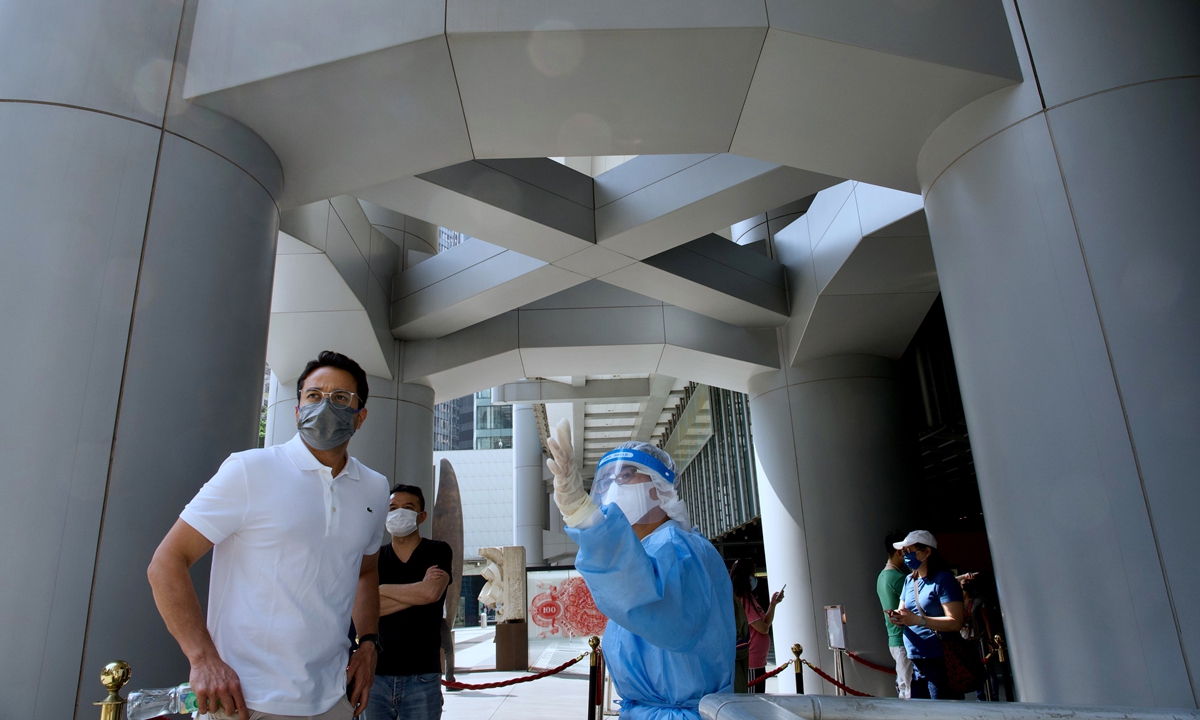
A staff member in a protective suit directs an HSBC employee to a temporary testing center for COVID-19 near the entrance to the bank's headquarters in Hong Kong on Wednesday. HSBC closed its Hong Kong headquarters after three coronavirus infections were confirmed. Photo: VCG
Observers and experts refuted foreign media reports hyping complaints from the expat finance community in the Hong Kong Special Administrative Region (HKSAR) about the government's quarantine measures amid the city's latest COVID-19 outbreak, saying the policies are necessary to protect Hong Kong residents and the city's economic recovery.
The COVID-19 outbreak in Hong Kong has rebounded after a surge that began at a local gym popular with foreigners. The latest outbreak left 132 people infected and more than 750 people were sent into isolation centers, some of them expat financiers.
Hong Kong reported eight locally transmitted cases on Wednesday, five of which were related to the cluster at the gym.
Public health experts said the new surge in the HKSAR should sound the alert to Hong Kong residents and prompt them to strictly follow the government's anti-epidemic policies to contain the spread of the disease.
HSBC temporarily closed its Hong Kong headquarters on Wednesday after three staff members were confirmed to have been infected with COVID-19.
The quarantine measures, including policies that require the children of COVID-19 patients to be sent to government-run isolation centers, have reportedly drawn complaints and concerns from expat finance community.
The Department of Health of Hong Kong noted that the quarantine center had the necessities for children and would provide assistance from on-site staff if necessary.
However, foreign media including the Financial Times hyped the complaints from expat financiers and quoted anonymous interviewees, expressing their fears that the strict quarantine rules could "undermine" the city's position as a global financial center and may lead to a "talent exodus."
Foreign financial observers and local residents refuted such claims, saying Hong Kong's financial position will not be easily shaken given its rich resources and opportunities, and the city's dynamism is not being damaged but instead protected by the government's strict response to the pandemic.
The government has learned its lessons from repeated emerging outbreaks due to lax anti-epidemic policies, including belated requirements for the testing and quarantine of overseas arrivals. Now, the government should stick to the quarantine policies for the infected and their close contacts to prevent the situation from worsening, He Liangliang, a Hong Kong-based observer and commentator, told the Global Times on Wednesday.
"It is a ridiculous claim with no foundation," said Angelo Giuliano, a Hong Kong-based financial consultant from Switzerland, noting that Hong Kong is at a very strategic location in the Greater Bay Area within an emerging superpower, and the city's international professionals are driven by opportunities and the quality of life.
Hong Kong was ranked fifth among all 111 financial hubs in the latest Global Financial Centers Index Report released in September 2020, up one place compared with the last index, despite challenges brought by the COVID-19 pandemic.
The economic recovery of Hong Kong could have been faster if not for the epidemic surges that repeatedly occurred in the city, which was partially due to belated anti-epidemic measures, said a director of the Hau Tak community in Sai Kung of Hong Kong, surnamed Jin.
She blasted those who reportedly believe the strict quarantine policy will drive out expat professionals for being "too short-sighted."
Hong Kong Chief Executive Carrie Lam said on Tuesday that everyone will be treated equally in the fight against the epidemic, regardless of their nationality.
Lam made the remarks after
two employees of the US Consulate General in Hong Kong tested positive for COVID-19 and were reported by Hong Kong media to have refused to accept quarantine arrangements, citing diplomatic immunity, which was later denied by the US consulate.
Giuliano attributed the reported complaints from foreign financiers to cultural differences, as Asians tend to look more at groups and communities as a whole, while foreigners look more at individual freedoms, which he believed was probably why the West had failed completely in dealing with the pandemic.
"Though the quarantine conditions in Hong Kong might be a bit harsh as they require three weeks of quarantine for overseas arrivals compared with other places that require 10-14 days, it is the price to pay to protect Hong Kong, its people and economy," he said.




